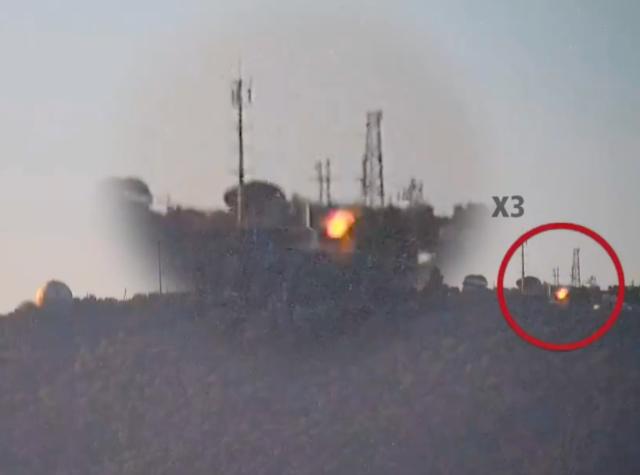In a marked escalation of hostilities, the Iranian-backed militant group Hezbollah launched a significant attack on a key Israeli air traffic control base in northern Israel, the Israeli Defense Forces (IDF) reported on Sunday. This latest aggression comes amid Israel's ongoing defensive operations against Hamas in Gaza, underscoring the multifaceted security challenges Israel faces.
The attack on Mount Meron’s air traffic control facility, while effectively countered by Israel's robust defense systems, signifies one of Hezbollah's most audacious moves in recent months. The IDF, demonstrating resilience and preparedness, reported no casualties and minimal damage, a testament to Israel’s commitment to safeguarding its infrastructure and citizens.
The IDF confirms damage was caused to the air control base in Mount Meron hit by #Hezbollah on Saturday. It is believed the site was attacked using an advanced lazer guided long range Kornet EM Missile. @i24NEWS_EN pic.twitter.com/8l5MmQl3LE
— Guy Azriel (@GuyAz) January 7, 2024
This latest development adds complexity to the already tense situation along Israel's borders. Hezbollah’s belligerence, particularly following the targeted elimination of a top Hamas leader in Beirut, believed to be carried out by Israel, is a provocative response that further destabilizes the region. Hezbollah has framed its actions as a retaliation, attempting to justify its unprovoked aggression against Israel.
Amidst these developments, U.S. Secretary of State Antony Blinken, recognizing the potential for regional escalation, emphasized the urgency of diplomatic interventions during his discussions in Qatar. However, the increasing hostilities between Israel and Hezbollah, coupled with the ongoing conflict in Gaza, pose significant challenges to peace efforts.
For Qatar, securing hostage release is incidental to its main aim: keep Hamas as a viable power by pushing Israel to end its Gaza operations.
— Daniel Roth (@daniel_c_roth) January 8, 2024
So Blinken gushing over the Qataris again today is quite nauseating. pic.twitter.com/JNfhV2O3Mz
Israel's military leadership, including IDF Chief of Staff Lt. Col. Herzi Halevi, has stressed the increasing pressure on Hezbollah. Israel’s strategic focus remains on preventing Hezbollah's strengthening along its borders. Prime Minister Benjamin Netanyahu's stern warning to Hezbollah echoes Israel's resolve to defend itself against terrorist threats, drawing on lessons from its engagement with Hamas.
The conflict in Gaza continues to demand international attention. The Israeli military's tactical shift to the southern regions of Gaza aims to dismantle Hamas's military capabilities while minimizing harm to civilians. Israel's efforts are focused on neutralizing the threat posed by Hamas, securing the return of hostages, and ensuring long-term security for its citizens.
The Biden administration, while advocating for a de-escalation of the conflict, acknowledges Israel's right to self-defense. Israel's targeted operations against Hamas leadership are part of its broader strategy to restore peace and stability.
"Jewish Americans...overwhelmingly back Biden’s handling of the war in his support for Israel’s right to self-defense and condemnation of the Oct. 7 attack and antisemitism." https://t.co/48s4EPD6XC pic.twitter.com/Z8uch0a7Ds
— Andrew Bates (@AndrewJBates46) January 3, 2024
The complexity of the situation is further highlighted by the tragic incidents in the West Bank and the humanitarian concerns in Gaza. Israel remains committed to differentiating between combatants and civilians, despite Hamas's tactics of operating within civilian areas, which significantly increases the risk to non-combatants.
The loss of life, including the deaths of journalists in Rafah, underscores the tragedy of conflict. Israel, maintaining its policy of not commenting on specific military actions, continues to navigate the challenges of combatting terrorism while striving to protect innocent lives. Many of the so-called journalists killed were in fact Hamas sympathizers or even members. They used their press crednetials to get close to Israeli positions and relayed information to Hamas leaders.
My intuition was correct. Journalists don't ride in vehicles with Hamas terrorists operating a drone. https://t.co/M3GdEW3ogc pic.twitter.com/9yP8E3diPW
— Eitan Fischberger (@EFischberger) January 8, 2024
In summary, Israel faces multifaceted security challenges from Hezbollah in the north and Hamas in Gaza. Despite these provocations, Israel remains steadfast in its commitment to defending its citizens and pursuing a path to peace, even in the face of relentless aggression. The international community's role in supporting diplomatic solutions and recognizing the complexity of the situation is crucial for the restoration of stability in the region.


